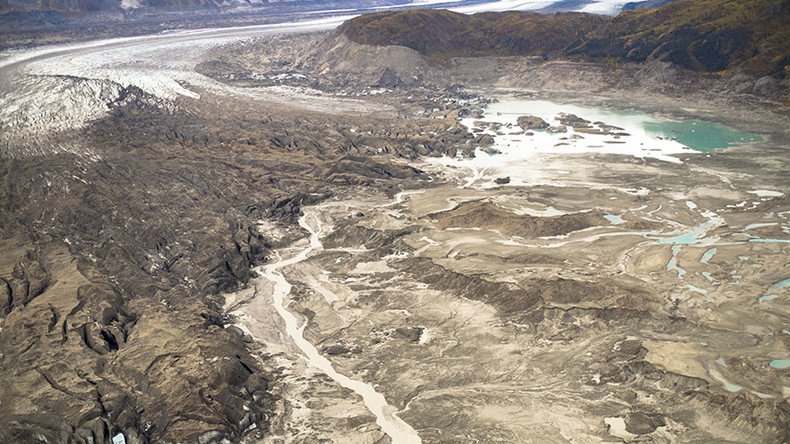‘River piracy’ phenomenon taking place at ‘breakneck speed,’ climate change to blame

A river in the Yukon territory in Canada has been re-routed as a result of climate change. Scientists believe it’s the first instance of “river piracy” caused by humans.
When Dan Shugar, a geoscientist at the University of Washington Tacoma, arrived at the Slims River last year to measure the water currents at its mouth, the river had disappeared. A retreating glacier in the Yukon caused a vast stream of meltwater to be rerouted from one river system to another.
By late summer, “there was barely any flow whatsoever. It was essentially a long, skinny lake,” Shugar said. “The water was somewhat treacherous to approach, because you’re walking on these old river sediments that were really goopy and would suck you in. And day by day we could see the water level dropping.”
‘Uncharted territory’: Drastic #climatechange in 2016 will continue this year – report https://t.co/thUPkWWQnqpic.twitter.com/XIZ03F69rd
— RT (@RT_com) March 21, 2017
In research published Monday in the journal Nature Geoscience, Shugar and his team detail how the warming atmosphere caused the toe (large front end) of the massive Kaskawulsh Glacier, one of the largest in Canada, to retreat across the mountain valley that is the source of the Slims River.
In 2016, pooling meltwater cut through the thinning glacier, opening a new outlet which, instead of draining northward towards the Bering Sea, started flowing southwards into the Kaskawulsh River and ultimately into the Pacific Ocean, some 1,330km (826 miles) from where it should have gone.
Melting sea ice may actually increase Arctic sea life – study https://t.co/A41v1oiDqFpic.twitter.com/VESAaB0N0n
— RT (@RT_com) March 31, 2017
In geological terms, this happened at “relatively breakneck speed,” according to the team, who cite climate change as the cause.
“The event is a bit idiosyncratic, given the peculiar geographic situation in which it happened, but in a broader sense it highlights the huge changes that glaciers are undergoing around the world due to climate change,” study co-author John Clague said in a press release.
Known as “river piracy,” it usually occurs as a result of erosion, landslides or tectonic motion in the Earth’s crust. This instance, however, is described as “one of the less-anticipated shifts.”
“Geologists have seen river piracy, but nobody to our knowledge has documented it happening in our lifetimes,” Shugar said. “People had looked at the geological record — thousands or millions of years ago — not the 21st century, where it’s happening under our noses.”












